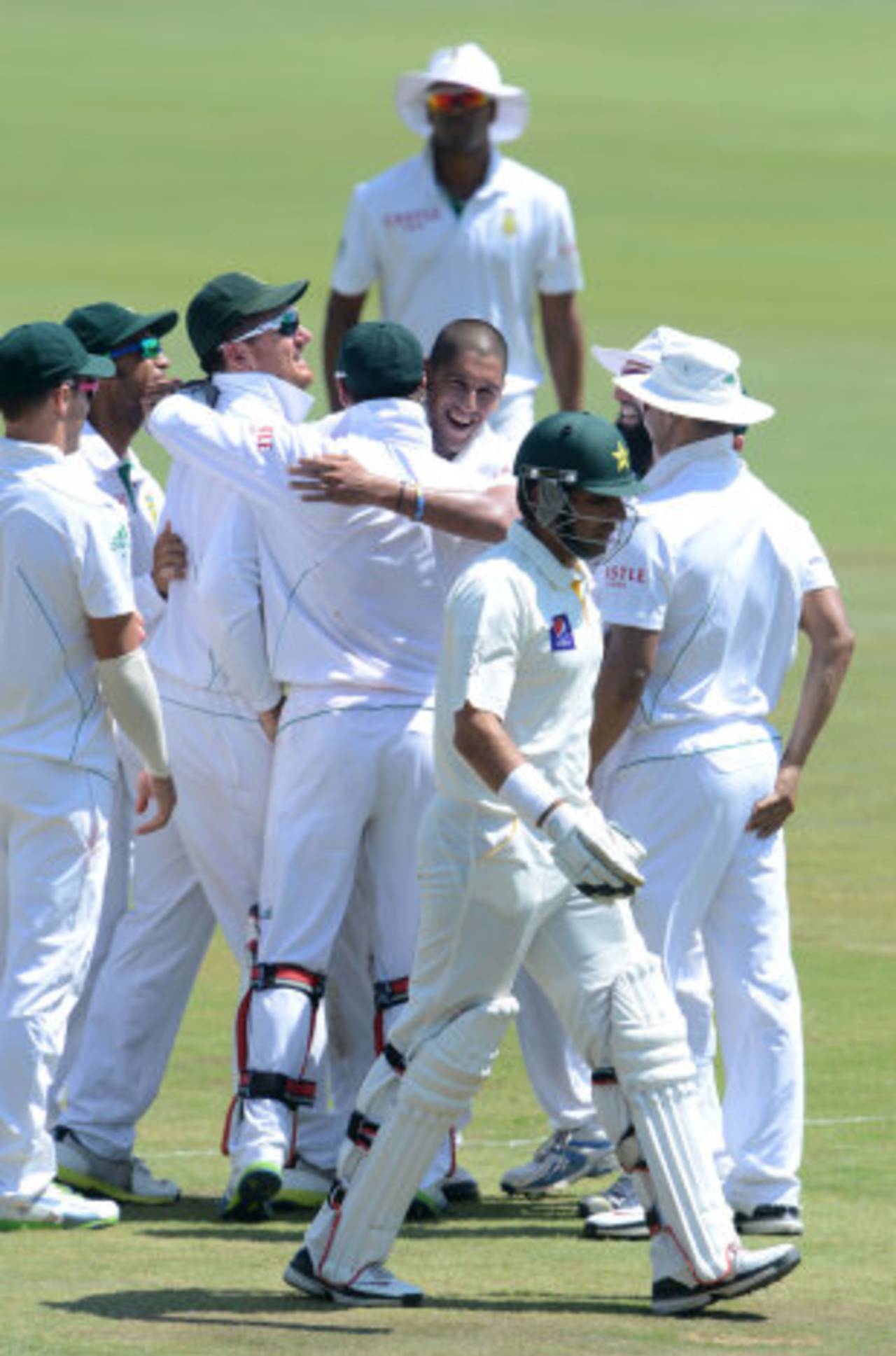Misbah-ul-Haq did not confront Pakistan's
whitewash with humiliation or anger. He met it with a plea. He asked for Pakistan to play more Test cricket, in conditions that will challenge them adequately.
Pakistan's next series is five months away. They travel to West Indies for two matches before meeting South Africa in the United Arab Emirates. They have not played at home since 2009 and have not played experienced pitches and conditions where swing and seam prevail since early 2011, when they visited New Zealand. Misbah is convinced this is hurting them and he wants effort to be made to give them more cricket.
"Not playing as much Test cricket as other countries is a concern for us and whoever does the schedule should consider this. We are only playing four or five Tests a year. That's a big worry," he said. "It's a worry for developing good Test players and for making sure we have enough players for Pakistan. We also need different pitches to play on. When we go to Australia, South Africa, New Zealand and England, it is an area of concern.
"We have to really consider that we need to get good sporting pitches for fast bowlers. We need pitches which have more bounce and more pace. That will help us with technique and to adjust to the conditions here."
Pakistan's inability to adapt was most evident in their batting. They only managed one innings total of more than 300 - that was
Cape Town on the tamest surface of the series. Against a bowling attack that was well-versed in exploiting every last inch of movement or bounce on offer, they were exposed mercilessly.
What caused most of their struggles was uncertainty and lack of footwork. As Vernon Philander and Kyle Abbott asked questions by ensuring their lengths were just back of good ones, everyone from Mohammad Hafeez to Younis Khan did not know whether to move forward or back.
Dale Steyn's pace and movement and Morne Morkel's bouncer were always expected to cause problems for Pakistan. Some may have expected they would deal with the subtlety better but even that proved a tough ask. "You need to play more in these conditions to be able to get used to it. It's all about experiencing these conditions," Misbah explained. "We were playing against the number one team in the world in their home conditions. We need to prepare much more professionally for that. South Africa exploited the conditions. They beat us in all departments."
"You need to play more in these conditions to be able to get used to it. We were playing against the number one team in their home conditions. They beat us in all departments"
Misbah-ul-Haq
With only one practice match before the first Test and a two-day game between the first and second fixtures, Misbah blamed conditions more than anything else for Pakistan's performances. It is the conditions that he thinks have made South Africa the best Test side around at the moment, and maybe he would know.
Pakistan have played two No. 1 teams in the last year or so, having beaten England in the UAE in 2012. Misbah thinks Graeme Smith's men may have the edge but primarily because they were at home. "The major difference is the conditions," he said. "When a number one team is playing in their conditions, everything is going their way. They can exploit their conditions. They know how to bat and bowl here. Conditions really affected the results."
A 3-0 scoreline is more a reflection of how superior South Africa are rather a sign of Pakistan's inferiority. Misbah knows that, which is why he will focus on the individual successes rather than the collective downfall.
"The way Asad Shafiq played is one of them," he said. "There were centuries by him and Younis Khan. Rahat Ali took six wickets here. Saeed Ajmal took ten in Cape Town. We performed in patches but we needed to put together performances as a team."
Had Junaid Khan not been injured, had Taufeeq Umar not had to go home before the series started, had Haris Sohail been available, perhaps things could have been different for Pakistan. Misbah thinks so. "A disappointment for us was the injuries that kept on hitting us," he said. "We had to keep changing batting line-ups and bowling attacks. We were really hurt by that." Pakistan did not play the same XI in any of the three Tests and the changes to their pace pack were all injury enforced.
There was also the issue of selection. Had Abdur Rehman featured in the Newlands Test, things may have been different. While Misbah isolated that as the one instance where Pakistan, the team rather than solitary players, were in a good position, he did not blame it for the defeat. "In the second Test match, we were in a good position but the batting collapse is our major issue and we have to just sort it out," he said.
Dissection of reasons for the whitewash will continue but for now, Pakistan have to look forward because they have another month, and seven matches, in South Africa. Misbah is upbeat that the Twenty20 and ODI series could bring Pakistan similar rewards as they did New Zealand earlier in the summer. Pakistan are strong in both formats, while South Africa are in transition. "It is a different story when you play in a different format," Misbah said. "It will be really good to have new players come in. They come in with fresh minds and that will really help the team."
Although the slew of limited-overs matches means results are rarely remembered, for Pakistan it will be a way to leave South Africa with reputation intact and that is what Misbah demanded of his men. "It's not the end of the world. It's up to us to try and play with a positive mind and try to pull it back."
Firdose Moonda is ESPNcricinfo's South Africa correspondent
